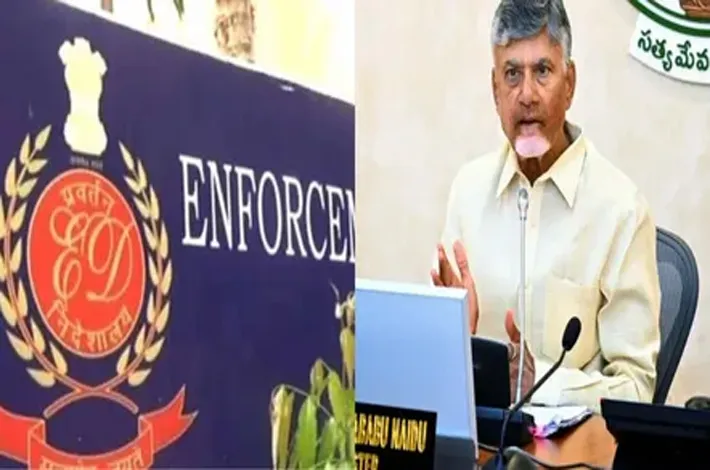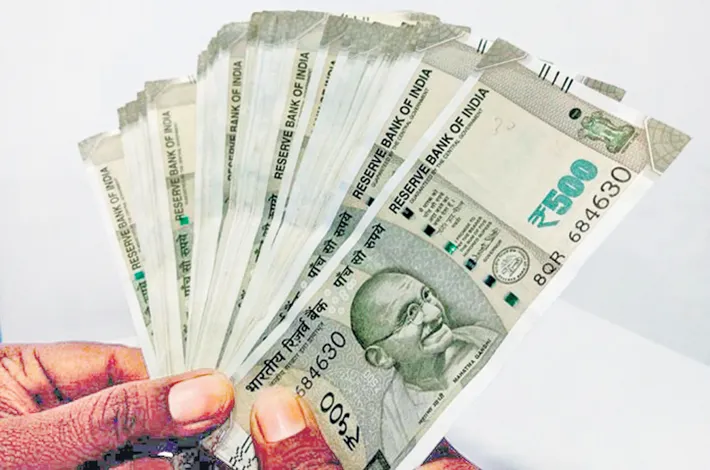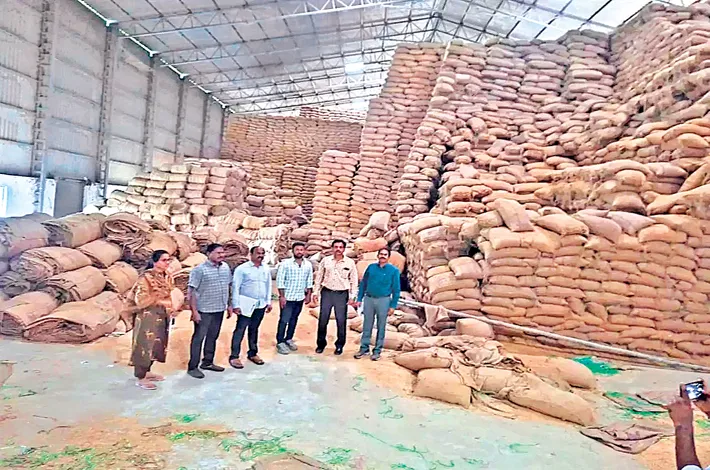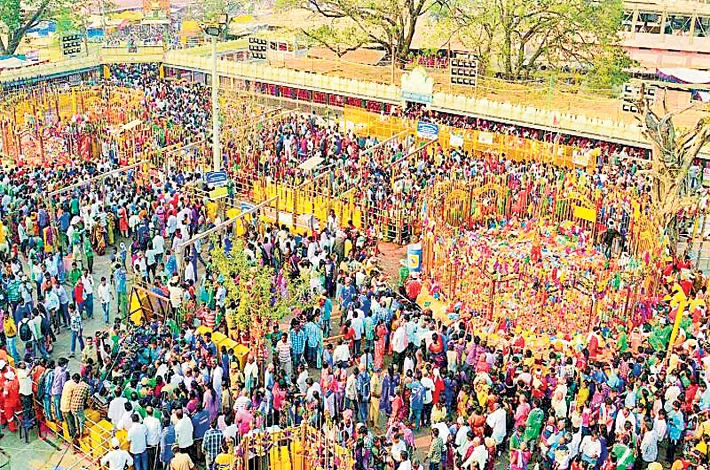When Patriotism Meets Pastry in Hyderabad
13-05-2025 12:00:00 AM
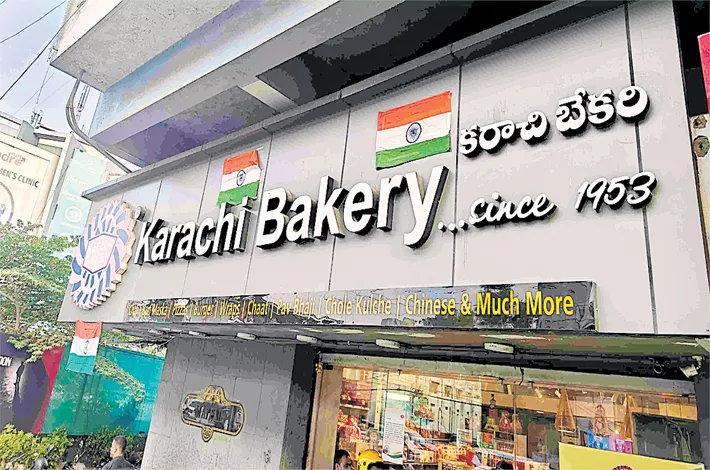
Never mind that their biscuits have united Hyderabadis across caste, creed, and cholesterol levels for decades. To these rowdy patriots, a name was enough to warrant mayhem
VJM Divakar I hyderabad
In the bazaars of Hyderabad, where biryani reigns supreme and the call of the morning chai is practically a civic anthem, a peculiar storm brewed recently. It wasn’t the monsoon, nor was it a tussle over who makes the best haleem.
No, this was a tempest of misguided patriotism, whipped up by a band of rabid right-wing activists who decided that their love for the nation could best be expressed by hurling stones at… a bakery. Specifically, Karachi Bakery, that beloved Hyderabadi institution known for its fruit biscuits, osmania delights, and an uncanny ability to make you forget your diet.
The scene was chaotic, absurd, and—if we’re being honest—a bit like watching a toddler throw a tantrum in a sweet shop. These self-proclaimed guardians of nationalism, armed with fervour and a startling lack of historical awareness, descended upon several Karachi Bakery outlets on the city’s outskirts. Their grievance? The name “Karachi,” which, in their fevered minds, was apparently a direct affront to the tricolor.
Never mind that Karachi Bakery has been a Hyderabadi staple for generations, owned by a Sindhi family who fled Pakistan post-partition to set up shop in the erstwhile Nizam state. Never mind that their biscuits have united Hyderabadis across caste, creed, and cholesterol levels for decades. To these rowdy patriots, a name was enough to warrant mayhem.
Let’s pause to appreciate the irony. Hyderabad, a city that wears its syncretic history like a well-tailored sherwani, is no stranger to names that defy simplistic borders. Take Tashkent Hotel, a legendary eatery on Nampally Station Road. In the 1980s, it was the place to be, not just for its steaming plates of mutton curry but for the Kabiliwallahs who ran their money-lending operations from its tables, probably while sipping Irani chai and discussing geopolitics. Was Tashkent Hotel a secret outpost of Uzbekistan? Of course not. It was as Hyderabadi as the Charminar, and nobody ever thought to lob a brick at it for its Central Asian moniker.
Then there’s the matter of the city’s beloved Irani cafes, those smoky dens of chai and bun maska where time seems to stand still, along with the waiters. These joints, with names like “Irani Hotel” or “Cafe Persia,” are often run by locals who wouldn’t know Tehran from Tirupati. Take Niloufer Cafe, a Telangana institution owned by a sahukar who probably laughs all the way to the bank while serving up plates of keema samosas. Does anyone storm these cafes, demanding they rename themselves “Bharat Bistro”? No, because Hyderabadis are too busy enjoying their chai to care about such nonsense.
But the pièce de résistance in this saga of misplaced outrage has to be Al Kabeer, one of India’s top slaughterhouses, located in Rudraram on Hyderabad’s outskirts. Brace yourself: it’s owned by a family of Jains, those paragons of non-violence who wouldn’t harm a fly, let alone a goat. Yet, there it stands, a thriving business with a name that could be straight out of a Middle Eastern souk, processing meat with industrial efficiency. Have our zealous activists picketed Al Kabeer for its Arabic-sounding name? Not yet, but give them time—they’re probably still recovering from the sugar crash after their bakery rampage.
This whole fiasco raises a question: when did patriotism become a synonym for ignorance? Brand names, as any Hyderabadi worth their dum ka murgh knows, are often divorced from their literal origins. Karachi Bakery isn’t a Pakistani conspiracy; it’s a love letter to a family’s roots, baked into every almond-studded biscuit. Tashkent Hotel isn’t flying the Uzbek flag; it’s just a cool name that stuck. And don’t even get me started on the “Bombay Bakery” outlets scattered across South India—are we to assume they’re smuggling pav bhaji across state lines?
he activists’ crusade is less about nationalism and more about a profound misunderstanding of how culture works. Hyderabad, with its Ganga-Jamuni tehzeeb, has always been a melting pot where names, cuisines, and identities blend like spices in a good korma. To attack a bakery for its name is to attack the very soul of the city—a soul that’s been shaped by migrations, empires, and the occasional culinary genius who decided to pair chai with a buttery biscuit.
Imagine if this logic were applied elsewhere. Should we rename Mumbai’s Taj Hotel because it sounds vaguely Mughal? Or boycott Delhi’s Connaught Place because it reeks of colonial baggage? And what about all those “Chinese” restaurants serving Manchurian gravy that would make an actual Beijinger weep? The mind boggles at the sheer absurdity.
In the aftermath of the Karachi Bakery attacks, Hyderabadis did what they do best: they shrugged, sipped their chai, and went back to buying their favorite biscuits. The bakery’s shelves remained stocked, its ovens kept churning, and its loyal customers—undeterred by the ruckus—continued to queue up. Because in Hyderabad, a good pastry trumps a bad tantrum any day.
s for the activists, one hopes they’ll take a moment to reflect, perhaps over a cup of Irani chai at a cafe with a suspiciously foreign name. They might learn that patriotism isn’t about smashing shopfronts or policing brand names. It’s about celebrating the messy, beautiful tapestry of a city like Hyderabad, where a Sindhi baker, a Jain slaughterhouse owner, and a Telangana sahukar can all thrive under the same sun. And if that lesson proves too hard to swallow, well, there’s always another biscuit to dunk in their chai.
It is no out of context to mention here that in the early 80s, the manager of the Mysore Cafe, a total south Indian vegetarian hotel, next to Golden Threshold on Nampally station road, used to have his morning breakfast, Parota with Kheema curry in Tashkent Hotel, while the manager of the Tashkent Hotel, will have his morning breakfast in the Mysore Cafe, Idli, Dosa, Vada and Sambhar!





